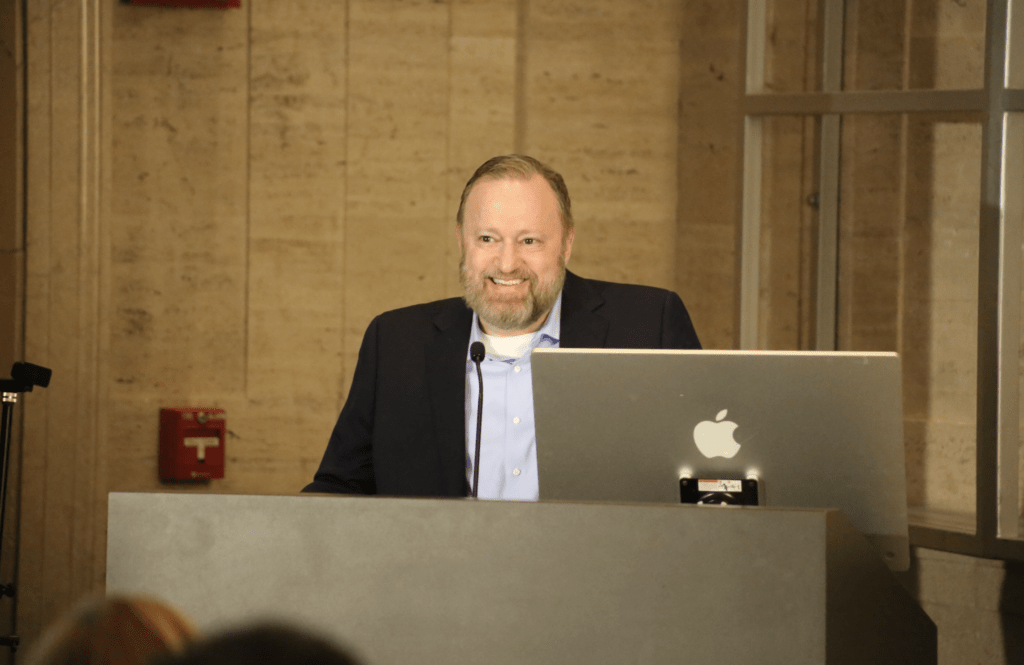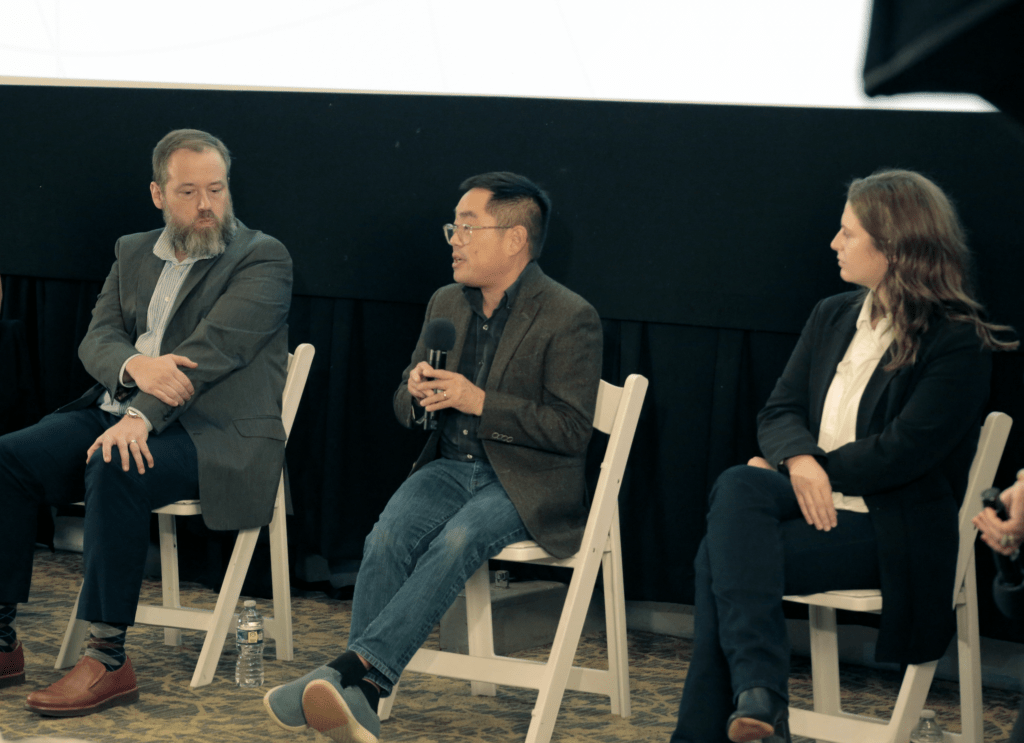Faculty Tackle Higher Ed, Creative Industries in the Age of AI

Faculty and staff gathered to dissect one of the hottest topics in higher education – the benefits and consequences of artificial intelligence – at the School of the Arts Fall Assembly on Thursday, October 26.
Emerson President Jay Bernhardt, in a pre-panel introduction, spoke about the importance of not only understanding AI’s potential, but also its implications for both the workforce and education.
“It’s our responsibility as teachers and mentors and academic leaders to understand it, recognize its disruptive potential, and be prepared for it. We especially need to consider how the disciplines where our graduates work and will work, especially in the creative fields, will be affected by AI,” he said.

Maria Koundoura, Assistant Provost and Interim Dean for School of the Arts, moderated the panel and kicked off the discussion by asking, “What is AI?”
Panelist Brian Basgen, Emerson’s Chief Information Officer, highlighted four relevant categories of AI tools: Chat GPT, audio-related products such as voice generation, image generation, and video generation.
He emphasized the emerging behaviors exhibited by AI tools and networks include the ability to acquire skills from one domain of knowledge and apply them to an entirely different domain of knowledge.
“That might not seem like a big deal for humans -it’s a similar skill set for us humans to cross domains,” said Basgen. “But for software to do that is really quite different and special.”
This newfound capability has opened up plenty of opportunities, particularly in the higher educational setting.
School of Communication Dean Brent Smith views AI as a tremendous opportunity to create an asset of public good. He said AI reduces the cost of information and intelligence, allowing more individuals to contribute their ideas and utilize AI to address existing gaps in society.
“We have great ideas but we also forget some of them,” said Smith. “Artificial intelligence can afford us possibilities of bringing our best selves constantly in touch with our best self.”
Professor Lisa Diercks, associate chair of Writing, Literature and Publishing, expanded on Smith’s remarks by elaborating on the positive influence of AI in terms of accessibility. AI serves as an “equalizer” in her class, Diercks said, enabling students who do not have the technology or past learning to express their ideas in a manner that can be easily shared with others.
Even though there are promising opportunities for students in the classroom, there are concerns about AI’s impact on the workforce. Visual and Media Arts Associate Professor Ed Lee, a screenwriter, said many creators in the film and journalism industry are “anxious” about whether AI will replace their jobs.

“There are a lot of journalistic jobs and copywriting jobs and sports writing jobs that have already been cut because AI is very good at creating a summary of what happened at a baseball game or what happened at a football game,” said Lee. “When I hear those stories, it hurts.”
In addition to the capability of AI to generate its own content, Lee said that employers are eager to collaborate with AI because it eliminates the need to address issues like unions, human resources concerns, and employee benefits.
Despite these concerns, Basgen said he isn’t too worried about AI’s potential to replace humans, at least for the time being.
“Using the technologies we have today to replace humans is not going to work very well,” said Basgen. “Without human interaction with these tools, their first outputs aren’t very good. If you don’t vet them, if you don’t think them through, if you don’t tweak them, you can get bad results. The state of technology today requires augmentation with people. Replacement is premature, at least at this exact moment in time.”
Sarah Calmas, Tech Ethics Lead for IBM’s AI Ethics Office and an attorney, believes that the advancement of AI will result in a growth of employment opportunities.
“You have to think about how [AI] is being adopted and why, and how it’s going to transform existing roles,” said Calmas. “There’s a right to be careful, there’s a right to be really thoughtful about how it’s approaching, but there’s an opportunity to be really creative on how we can transform roles.”
The SOA panel won’t be the last discussion on AI at Emerson. Bernhardt said a new President’s Working Group on Artificial Intelligence will be led by Assistant Provost Brooke Knight and be composed of faculty, staff, and students from across the College.
“This [President’s Working Group] will help us at Emerson identify how we can and should address AI going forward, from teaching and assessment and academic programs, as well as looking at scholarship and leadership in these areas,” said Bernhardt.
Categories